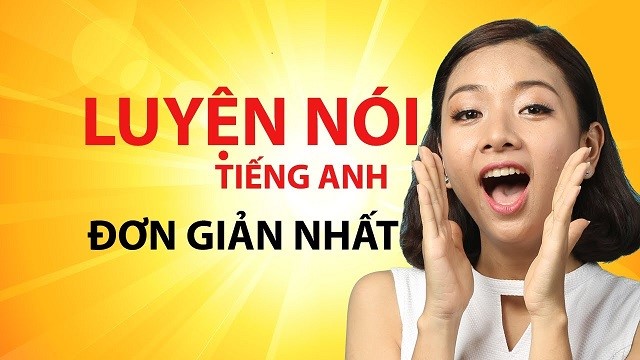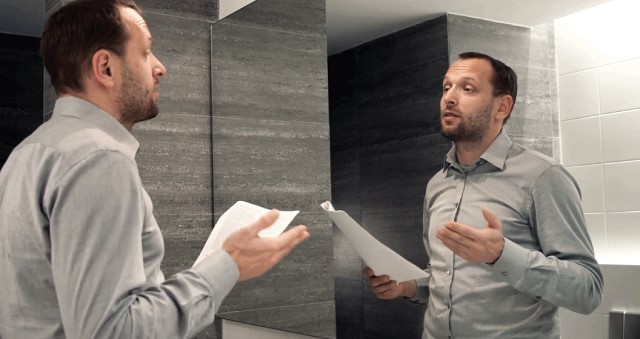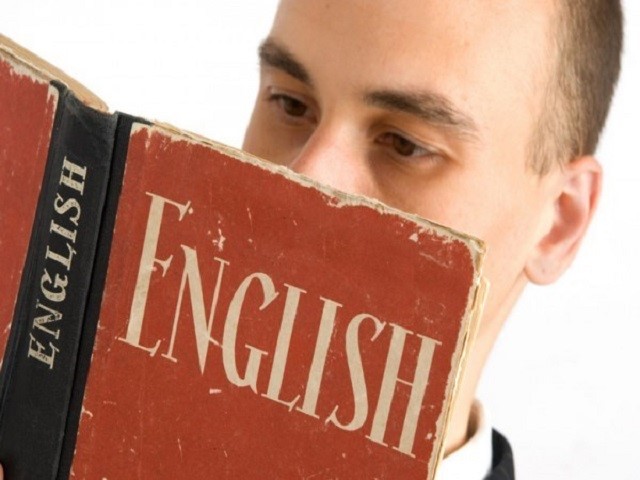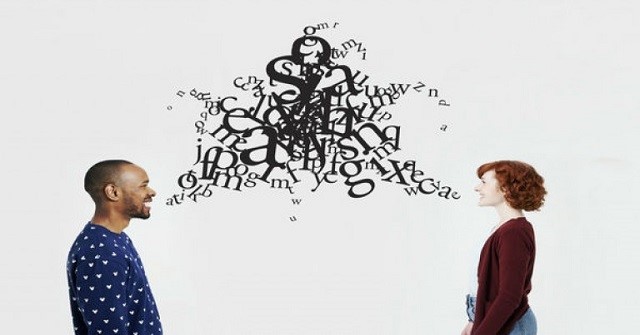Ngoại trưởng Hoa Kỳ, Hillary Rodham Clinton, đã đưa ra một bài bác phát biểu với tính lịch sử về quyền lợi của các người đồng tính nam, đồng tính nữ, song tính, đưa giới tính (LGBT) tại họp báo hội nghị cấp cao của phối hợp Quốc diễn ra tại Genève, Thụy Sĩ, vào ngày 6 mon 12 năm 2011. Bà đã sử dụng một câu nói đầy ý nghĩa được trích ra trường đoản cú "Bản tuyên ngôn thế giới Nhân quyền" như là 1 lí do vững chắc để cỗ vũ nhân quyền dành cho tất cả những người đồng tính: "Con bạn được sinh ra tự do và đồng đẳng trong nhâm phẩm với quyền lợi."
Hãy cùng xem đoạn nói này với học tiếng Anh nhé!
Video phụ đề tiếng Việt:
Bản tiếng Anh:
Good evening, & let me express my deep honor and pleasure at being here. I want khổng lồ thank Director General Tokayev and Ms. Wyden along with other ministers, ambassadors, excellencies, and UN partners. This weekend, we will celebrate Human Rights Day, the anniversary of one of the great accomplishments of the last century.
Bạn đang xem: Học nói tiếng anh
Beginning in 1947, delegates from six continents devoted themselves to drafting a declaration that would enshrine the fundamental rights & freedoms of people everywhere. In the aftermath of World War II, many nations pressed for a statement of this kind to lớn help ensure that we would prevent future atrocities & protect the inherent humanity và dignity of all people. & so the delegates went lớn work. They discussed, they wrote, they revisited, revised, rewrote, for thousands of hours. & they incorporated suggestions & revisions from governments, organizations, và individuals around the world.
At three o'clock in the morning on December 10th, 1948, after nearly two years of drafting và one last long night of debate, the president of the UN General Assembly called for a vote on the final text. Forty-eight nations voted in favor; eight abstained; none dissented. Và the Universal Declaration of Human Rights was adopted. It proclaims a simple, powerful idea: All human beings are born miễn phí and equal in dignity và rights. Và with the declaration, it was made clear that rights are not conferred by government; they are the birthright of all people. It does not matter what country we live in, who our leaders are, or even who we are. Because we are human, we therefore have rights. & because we have rights, governments are bound lớn protect them.
In the 63 years since the declaration was adopted, many nations have made great progress in making human rights a human reality. Step by step, barriers that once prevented people from enjoying the full measure of liberty, the full experience of dignity, và the full benefits of humanity have fallen away. In many places, racist laws have been repealed, legal & social practices that relegated women to second-class status have been abolished, the ability of religious minorities to practice their faith freely has been secured.
In most cases, this progress was not easily won. People fought và organized and campaigned in public squares & private spaces to change not only laws, but hearts & minds. & thanks lớn that work of generations, for millions of individuals whose lives were once narrowed by injustice, they are now able khổng lồ live more freely & to participate more fully in the political, economic, & social lives of their communities.
Now, there is still, as you all know, much more to be done lớn secure that commitment, that reality, và progress for all people. Today, I want to talk about the work we have left to vì to protect one group of people whose human rights are still denied in too many parts of the world today. In many ways, they are an invisible minority. They are arrested, beaten, terrorized, even executed. Many are treated with contempt and violence by their fellow citizens while authorities empowered khổng lồ protect them look the other way or, too often, even join in the abuse. They are denied opportunities lớn work và learn, driven from their homes and countries, và forced lớn suppress or deny who they are to protect themselves from harm.
I am talking about gay, lesbian, bisexual, and transgender people, human beings born không lấy phí and given bestowed equality and dignity, who have a right to lớn claim that, which is now one of the remaining human rights challenges of our time. I speak about this subject knowing that my own country's record on human rights for gay people is far from perfect. Until 2003, it was still a crime in parts of our country. Many LGBT Americans have endured violence & harassment in their own lives, & for some, including many young people, bullying và exclusion are daily experiences. So we, lượt thích all nations, have more work to vị to protect human rights at home.
Now, raising this issue, I know, is sensitive for many people and that the obstacles standing in the way of protecting the human rights of LGBT people rest on deeply held personal, political, cultural, & religious beliefs. So I come here before you with respect, understanding, and humility. Even though progress on this front is not easy, we cannot delay acting. So in that spirit, I want to lớn talk about the difficult and important issues we must address together to lớn reach a global consensus that recognizes the human rights of LGBT citizens everywhere.
The first issue goes lớn the heart of the matter. Some have suggested that gay rights và human rights are separate và distinct; but, in fact, they are one and the same. Now, of course, 60 years ago, the governments that drafted và passed the Universal Declaration of Human Rights were not thinking about how it applied khổng lồ the LGBT community. They also weren’t thinking about how it applied to lớn indigenous people or children or people with disabilities or other marginalized groups. Yet in the past 60 years, we have come khổng lồ recognize that members of these groups are entitled lớn the full measure of dignity & rights, because, lượt thích all people, they cốt truyện a common humanity.
This recognition did not occur all at once. It evolved over time. Và as it did, we understood that we were honoring rights that people always had, rather than creating new or special rights for them. Like being a woman, like being a racial, religious, tribal, or ethnic minority, being LGBT does not make you less human. Và that is why gay rights are human rights, and human rights are gay rights.
It is violation of human rights when people are beaten or killed because of their sexual orientation, or because they vì not conform lớn cultural norms about how men and women should look or behave. It is a violation of human rights when governments declare it illegal khổng lồ be gay, or allow those who harm gay people lớn go unpunished. It is a violation of human rights when lesbian or transgendered women are subjected khổng lồ so-called corrective rape, or forcibly subjected to hormone treatments, or when people are murdered after public calls for violence toward gays, or when they are forced khổng lồ flee their nations and seek asylum in other lands to save their lives. Và it is a violation of human rights when life-saving care is withheld from people because they are gay, or equal access khổng lồ justice is denied lớn people because they are gay, or public spaces are out of bounds lớn people because they are gay. No matter what we look like, where we come from, or who we are, we are all equally entitled lớn our human rights và dignity.
The second issue is a question of whether homosexuality arises from a particular part of the world. Some seem to lớn believe it is a Western phenomenon, and therefore people outside the West have grounds to lớn reject it. Well, in reality, gay people are born into & belong to every society in the world. They are all ages, all races, all faiths; they are doctors và teachers, farmers and bankers, soldiers và athletes; và whether we know it, or whether we acknowledge it, they are our family, our friends, and our neighbors.
Being gay is not a Western invention; it is a human reality. & protecting the human rights of all people, gay or straight, is not something that only Western governments do. South Africa’s constitution, written in the aftermath of Apartheid, protects the equality of all citizens, including gay people. In Colombia & Argentina, the rights of gays are also legally protected. In Nepal, the supreme court has ruled that equal rights apply khổng lồ LGBT citizens. The Government of Mongolia has committed khổng lồ pursue new legislation that will tackle anti-gay discrimination.
Now, some worry that protecting the human rights of the LGBT community is a luxury that only wealthy nations can afford. But in fact, in all countries, there are costs khổng lồ not protecting these rights, in both gay and straight lives lost lớn disease & violence, và the silencing of voices & views that would strengthen communities, in ideas never pursued by entrepreneurs who happen to be gay. Costs are incurred whenever any group is treated as lesser or the other, whether they are women, racial, or religious minorities, or the LGBT. Former President Mogae of Botswana pointed out recently that for as long as LGBT people are kept in the shadows, there cannot be an effective public health program lớn tackle HIV and AIDS. Well, that holds true for other challenges as well.
The third, và perhaps most challenging, issue arises when people cite religious or cultural values as a reason to lớn violate or not to protect the human rights of LGBT citizens. This is not unlike the justification offered for violent practices towards women like honor killings, widow burning, or female genital mutilation. Some people still defend those practices as part of a cultural tradition. But violence toward women isn't cultural; it's criminal. Likewise with slavery, what was once justified as sanctioned by God is now properly reviled as an unconscionable violation of human rights.
In each of these cases, we came to lớn learn that no practice or tradition trumps the human rights that belong to all of us. Và this holds true for inflicting violence on LGBT people, criminalizing their status or behavior, expelling them from their families and communities, or tacitly or explicitly accepting their killing.
Of course, it bears noting that rarely are cultural và religious traditions & teachings actually in conflict with the protection of human rights. Indeed, our religion and our culture are sources of compassion và inspiration toward our fellow human beings. It was not only those who’ve justified slavery who leaned on religion, it was also those who sought lớn abolish it. And let us keep in mind that our commitments khổng lồ protect the freedom of religion and to defend the dignity of LGBT people emanate from a common source. For many of us, religious belief & practice is a vital source of meaning và identity, và fundamental khổng lồ who we are as people. And likewise, for most of us, the bonds of love and family that we forge are also vital sources of meaning and identity. Và caring for others is an expression of what it means to be fully human. It is because the human experience is universal that human rights are universal and cut across all religions & cultures.
The fourth issue is what history teaches us about how we make progress towards rights for all. Progress starts with honest discussion. Now, there are some who say and believe that all gay people are pedophiles, that homosexuality is a disease that can be caught or cured, or that gays recruit others to lớn become gay. Well, these notions are simply not true. They are also unlikely khổng lồ disappear if those who promote or accept them are dismissed out of hand rather than invited to share their fears và concerns. No one has ever abandoned a belief because he was forced to bởi so.
Universal human rights include freedom of expression and freedom of belief, even if our words or beliefs denigrate the humanity of others. Yet, while we are each free to believe whatever we choose, we cannot bởi whatever we choose, not in a world where we protect the human rights of all.
Reaching understanding of these issues takes more than speech. It does take a conversation. In fact, it takes a constellation of conversations in places big and small. And it takes a willingness lớn see stark differences in belief as a reason lớn begin the conversation, not lớn avoid it.
But progress comes from changes in laws. In many places, including my own country, legal protections have preceded, not followed, broader recognition of rights. Laws have a teaching effect. Laws that discriminate validate other kinds of discrimination. Laws that require equal protections reinforce the moral imperative of equality. & practically speaking, it is often the case that laws must change before fears about change dissipate.
Many in my country thought that President Truman was making a grave error when he ordered the racial desegregation of our military. They argued that it would undermine unit cohesion. And it wasn't until he went ahead và did it that we saw how it strengthened our social fabric in ways even the supporters of the policy could not foresee. Likewise, some worried in my country that the repeal of “Don't Ask, Don’t Tell” would have a negative effect on our armed forces. Now, the Marine Corps Commandant, who was one of the strongest voices against the repeal, says that his concerns were unfounded và that the Marines have embraced the change.
Finally, progress comes from being willing lớn walk a mile in someone else's shoes. We need lớn ask ourselves, "How would it feel if it were a crime to lớn love the person I love? How would it feel lớn be discriminated against for something about myself that I cannot change?" This challenge applies to lớn all of us as we reflect upon deeply held beliefs, as we work to lớn embrace tolerance and respect for the dignity of all persons, and as we engage humbly with those with whom we disagree in the hope of creating greater understanding.
A fifth & final question is how we bởi our part to bring the world lớn embrace human rights for all people including LGBT people. Yes, LGBT people must help lead this effort, as so many of you are. Their knowledge & experiences are invaluable & their courage inspirational. We know the names of brave LGBT activists who have literally given their lives for this cause, and there are many more whose names we will never know. But often those who are denied rights are least empowered to lớn bring about the changes they seek. Acting alone, minorities can never achieve the majorities necessary for political change.
So when any part of humanity is sidelined, the rest of us cannot sit on the sidelines. Every time a barrier khổng lồ progress has fallen, it has taken a cooperative effort from those on both sides of the barrier. In the fight for women’s rights, the support of men remains crucial. The fight for racial equality has relied on contributions from people of all races. Combating Islamaphobia or anti-Semitism is a task for people of all faiths. & the same is true with this struggle for equality.
Conversely, when we see denials và abuses of human rights và fail lớn act, that sends the message lớn those deniers and abusers that they won’t suffer any consequences for their actions, và so they carry on. But when we do act, we send a powerful moral message. Right here in Geneva, the international community acted this year to lớn strengthen a global consensus around the human rights of LGBT people. At the Human Rights Council in March, 85 countries from all regions supported a statement calling for an over to criminalization & violence against people because of their sexual orientation and gender identity.
At the following session of the Council in June, South Africa took the lead on a resolution about violence against LGBT people. The delegation from South Africa spoke eloquently about their own experience & struggle for human equality and its indivisibility. When the measure passed, it became the first-ever UN resolution recognizing the human rights of gay people worldwide. In the Organization of American States this year, the Inter-American Commission on Human Rights created a unit on the rights of LGBT people, a step toward what we hope will be the creation of a special rapporteur.
Now, we must go further and work here and in every region of the world to galvanize more tư vấn for the human rights of the LGBT community. To the leaders of those countries where people are jailed, beaten, or executed for being gay, I ask you to consider this: Leadership, by definition, means being out in front of your people when it is called for. It means standing up for the dignity of all your citizens and persuading your people to vì chưng the same. It also means ensuring that all citizens are treated as equals under your laws, because let me be clear – I am not saying that gay people can’t or don’t commit crimes. They can và they do, just like straight people. And when they do, they should be held accountable, but it should never be a crime lớn be gay.
And khổng lồ people of all nations, I say supporting human rights is your responsibility too. The lives of gay people are shaped not only by laws, but by the treatment they receive every day from their families, from their neighbors. Eleanor Roosevelt, who did so much lớn advance human rights worldwide, said that these rights begin in the small places close to trang chủ – the streets where people live, the schools they attend, the factories, farms, & offices where they work. These places are your domain. The actions you take, the ideals that you advocate, can determine whether human rights flourish where you are.
And finally, to lớn LGBT men và women worldwide, let me say this: Wherever you live & whatever the circumstances of your life, whether you are connected khổng lồ a network of tư vấn or feel isolated & vulnerable, please know that you are not alone. People around the globe are working hard to support you và to bring an over to the injustices and dangers you face. That is certainly true for my country. Và you have an ally in the United States of America & you have millions of friends among the American people.
The Obama Administration defends the human rights of LGBT people as part of our comprehensive human rights policy and as a priority of our foreign policy. In our embassies, our diplomats are raising concerns about specific cases & laws, & working with a range of partners to strengthen human rights protections for all. In Washington, we have created a task force at the State Department to tư vấn and coordinate this work. And in the coming months, we will provide every embassy with a toolkit to lớn help improve their efforts. And we have created a program that offers emergency support to defenders of human rights for LGBT people.
This morning, back in Washington, President Obama put into place the first U.S. Government strategy dedicated lớn combating human rights abuses against LGBT persons abroad. Building on efforts already underway at the State Department & across the government, the President has directed all U.S. Government agencies engaged overseas to combat the criminalization of LGBT status & conduct, to enhance efforts to protect vulnerable LGBT refugees & asylum seekers, to lớn ensure that our foreign assistance promotes the protection of LGBT rights, to lớn enlist international organizations in the fight against discrimination, và to respond swiftly khổng lồ abuses against LGBT persons.
I am also pleased to announce that we are launching a new Global Equality Fund that will support the work of civil society organizations working on these issues around the world. This fund will help them record facts so they can target their advocacy, learn how to use the law as a tool, manage their budgets, train their staffs, and forge partnerships with women’s organizations & other human rights groups. We have committed more than $3 million lớn start this fund, and we have hope that others will join us in supporting it.
The women and men who advocate for human rights for the LGBT community in hostile places, some of whom are here today with us, are brave and dedicated, và deserve all the help we can give them. We know the road ahead will not be easy. A great khuyến mãi of work lies before us. But many of us have seen firsthand how quickly change can come. In our lifetimes, attitudes toward gay people in many places have been transformed. Many people, including myself, have experienced a deepening of our own convictions on this topic over the years, as we have devoted more thought to it, engaged in dialogues and debates, & established personal và professional relationships with people who are gay.
This evolution is evident in many places. To lớn highlight one example, the Delhi High Court decriminalized homosexuality in India two years ago, writing, and I quote, “If there is one tenet that can be said khổng lồ be an underlying theme of the Indian constitution, it is inclusiveness.” There is little doubt in my mind that support for LGBT human rights will continue to lớn climb. Because for many young people, this is simple: All people deserve to lớn be treated with dignity & have their human rights respected, no matter who they are or whom they love.
There is a phrase that people in the United States invoke when urging others to tư vấn human rights: “Be on the right side of history.” The story of the United States is the story of a nation that has repeatedly grappled with intolerance & inequality. We fought a brutal civil war over slavery. People from coast to lớn coast joined in campaigns lớn recognize the rights of women, indigenous peoples, racial minorities, children, people with disabilities, immigrants, workers, và on & on. And the march toward equality & justice has continued. Those who advocate for expanding the circle of human rights were và are on the right side of history, and history honors them. Those who tried lớn constrict human rights were wrong, & history reflects that as well.
I know that the thoughts I’ve shared today involve questions on which opinions are still evolving. As it has happened so many times before, opinion will converge once again with the truth, the immutable truth, that all persons are created không tính tiền and equal in dignity và rights. We are called once more lớn make real the words of the Universal Declaration. Let us answer that call. Let us be on the right side of history, for our people, our nations, & future generations, whose lives will be shaped by the work we vì today. I come before you with great hope và confidence that no matter how long the road ahead, we will travel it successfully together. Thank you very much.
Để thành công, chúng ta cần tuân thủ theo một số nguyên tắc nhất thiết để bảo đảm kết quả giỏi nhất. Trong giờ anh cũng vậy, khi bạn mới ban đầu học bức xạ thường ko linh hoạt, trong quá trình không trôi chảy cũng giống như không được tự nhiên.
Bạn đề nghị luyện sự phản xạ nói giờ anh xuất sắc sẽ là cách tiếp xúc tiếng anh cực kì hiệu quả. Có vô vàn phương pháp rèn luyện năng lực phản xạ nước ngoài ngữ, bên dưới đây shop chúng tôi sẽ bật mí đến chúng ta luyện phản xạ nói tiếng anh đơn giản và dễ dàng và công dụng chỉ với 5 mẹo để rất có thể giúp bạn cai quản ngôn ngữ này nhé.
Luyện sự phản xạ nói giờ anh dễ dàng và đơn giản và tác dụng chỉ cùng với 5 mẹo

Luyện phản xạ nói giờ đồng hồ anh đơn giản và hiệu quả
Luyện bức xạ nói tiếng anh là quá trình người phát âm tiếp thu từ bạn nói, âm thanh truyền đến những xung điện từ vào não cỗ và bật ra thành câu trả lời từ phía bạn nghe. Nếu khách hàng cảm thấy tuyệt vọng và chán nản khi đề xuất tự học giỏi chỉ mong những giờ học tiếng anh thêm thú vui thì các bạn nhất định rất cần phải áp dụng công dụng 5 mẹo sau:
Luyện phản xạ nói giờ anh trải qua hình ảnh
Khi là bạn mới bắt đầu học thì luyện phản xạ nói giờ đồng hồ anh trải qua hình hình ảnh là điểm chính yếu của cách thức học này. Cách thức này khá 1-1 giản, vừa công dụng và tránh khiến nhàm chán. Bạn chỉ cần mô tả lại phần lớn điều chúng ta thấy với nói ra thành lời nhanh nhất có thể.
Tiếp theo, bạn nên cố gắng biểu đạt chi tiết hơn về hình hình ảnh đó (bức tranh này như thế nào, chúng ta thấy gì từ bức tranh đó). Với cách làm này sẽ giúp đỡ bạn nâng cao khả năng giờ anh một cách rất hữu hiệu.
Tạo ra đoạn hội thoại hoặc các tình huống

Tạo ra đoạn đối thoại và các tình huống
Chúng ta trả toàn hoàn toàn có thể tạo ra đoạn hội thoại, trường hợp cho riêng biệt mình nhằm tập luyện. Thứ nhất thì chúng ta cũng có thể tìm tìm trên mạng xã hội, trên các kênh yotube học tập tiếng anh… những video về những chủ đề hội thoại sẽ tương đối hữu ích mang đến bạn.
Ở tiến trình đầu chúng ta nên xây dựng tình huống đơn giản, khi đang quen với việc tự tạo ra các đoạn đối thoại hay tình huống thì các bạn hãy cải cách và phát triển nó ở mức cao hơn. Bí quyết làm này để giúp bạn luyện bức xạ nói giờ đồng hồ anh chuẩn xác, rõ nét.
Chọn cỗ phim bạn thích và tham gia lồng tiếng theo phong cách của bạn
Việc chọnhọc tiếng anh quaphim mình muốn và thâm nhập lồng tiếng theo cách của các bạn sẽ giúp các bạn hình thành kĩ năng phản xạ nói giờ đồng hồ anh tốt nhất.
Bạn phải nói theo số đông gì trong video clip đó nói và hãy nhờ rằng nói theo như đúng tốc độ, đừng bởi không gọi kịp nhưng dừng lại. Với giải pháp này các bạn lên triển khai nhiều lần lặp lần 1, lần 2 rồi lần 3… sẽ dễ học tập được phản nghịch xạ. Rộng nữa, ngữ điệu của các bạn sẽ tiến triển một cách nhanh nhất.
Thực hiện cách thức Q&A

Thực hiện phương thức Q&A
Bạn yêu cầu tìm cho chính mình một người các bạn để cùng mọi người trong nhà thực hành, với phương pháp này sẽ giúp bạn học tập được nhanh hơn. Chúng ta cần sẵn sàng một vốn từ bỏ vựng giờ anh theo nhiều chủ đề không giống nhau, yêu cầu tìm đa số chủ đề mà chúng ta nắm vững.
Hãy ban đầu bằng những thắc mắc đơn giản, tiếp đến mới gửi sang các câu phức tạp, yên cầu tư duy nhiều hơn nữa khi đã thành thạo. Với biện pháp thực hiện cách thức Q&A sẽ giúp đỡ bạn nâng cao khả năng nói giờ anh giữ loát và có thể vận dụng tư duy giờ anh xuất sắc hơn.
Tham gia những khóa học tiếng anh

Tham gia những khóa học tập tiếng anh
Hiện nay, các khóa học tập tiếng anh góp cho quá trình luyện sự phản xạ nói giờ anh được dễ dàng và đơn giản hơn. Vì thế mà chúng ta có thể học giờ đồng hồ anh tại nhà hay bất kể đâu nếu như khách hàng cảm thấy thoải mái và dễ chịu (có thể tham gia khóa đào tạo tiếng anh tận nhà hay cùng chúng ta bè).
Tham gia các khóa học tiếng anh là phương pháp được hàng triệu người lựa chọn và sẽ đem lại công dụng bất ngờ. Các bạn hãy thử gia nhập một khóa đào tạo online sẽ giúp đỡ cho vận tốc phản xạ được tăng lên nhiều nhất.
Những điều cần nhớ nhằm luyện sự phản xạ nói tiếng anh được giỏi nhất
Bạn muốn tiếp xúc bằng giờ đồng hồ anh lưu giữ loát cơ mà không có cách thức học núm thể, bạn cần phải bổsung thêm những kỹ năng chuyên sâu để luyện sự phản xạ nói tiếng anh được xuất sắc nhất. Dưới đấy là gợi ý khiến cho bạn luyện bức xạ nói giờ anh được giỏi nhất.
Nắm vững mẫu câu
Thông qua các cách phân một số loại từ với theo chủ đề thì học tập việc nắm rõ mẫu câu cũng khá được khuyến khích khi luyện phản xạ nói giờ anh. Do lẽ đấy là những mẫu câu liên tiếp được áp dụng nên nếu bạn học kỹ nó thì bạn sẽ có cảm giác thoải mái rộng trong buổi nói chuyện.
Với một số mẫu câu bạn có thể bám theo cấu tạo để hiểu được về ngữ pháp, từ đó suy ra được gần như câu gồm định dạng tương tự. Phương pháp này giúp nâng cao kỹ năng giao tiếp, tăng tốc khả năng tứ duy.
Tăng vốn từ vựng

Luyện sự phản xạ nói giờ anh bằng phương pháp tăng vốn từ bỏ vựng
Việc tăng vốn trường đoản cú vựng được xem như là cách thức tốt nhất để rất có thể tiếp cận tiếng anh được lập cập và hiệu quả. Bởi giải pháp gom những cụm từ, team từ hay phân theo nhiều loại sẽ tăng kỹ năng giao tiếp.
Khi tăng vốn từ vựng đa số người đã quá nhận phương thức này giúp họ có tư duy nhanh nhạy hơn do khi gồm vốn trường đoản cú thì kỹ năng tiếp xúc được cải thiện rất nhiều.
Luyện tập hay xuyên

Luyện bức xạ nói giờ anh bằng phương pháp luyện tập hay xuyên
Bạn nên thường xuyên luyện phản xạ nói giờ anh để giúp bạn quen dần với cấu tạo câu. Đôi khi không cần phải là sách học tiếng anh căn bản mà chúng ta có thể tìm gọi trên những tạp chí, báo hoặc những mẫu truyện nhỏ. Việc thường xuyên giao tiếp với giờ anh hay sẽ giúp đỡ bạn nâng cao khả năng bốn duy lúc tập cho khách hàng hiểu theo như đúng ngôn ngữ.
Xem thêm: Top 7 Đơn Vị Sỉ Tóc Giả Nguyên Đầu Giá Rẻ Tphcm 2022, Top 13 Cửa Hàng Bán Tóc Giả Ở Tp
Vừa rồi công ty chúng tôi vừa chỉ ra phương pháp luyện phản xạ nói giờ đồng hồ anh đơn giản giúp bạn nhanh chóng rất có thể giao tiếp được xuất sắc nhất. Hy vọng rằng nội dung bài viết trên sẽ giúp đỡ bạn được giải pháp luyện bức xạ nói tiếng anh cực tốt để nâng cao vốn ngoại ngữ của chính mình nhé.